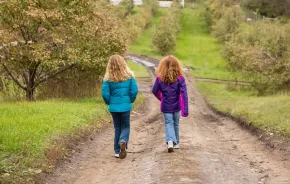This post by Positive Discipline Trainer Casey O'Roarty is part of our Growing Character series on teaching kids honesty and accountability.
We have searched and searched and can’t find a single adult who never told a lie as a child. Actually we can’t find any adults who never lie now. Isn’t it interesting how upset parents get when children have not mastered a virtue they have not mastered themselves? We do not make this point to justify lying, but to show that children who lie are not defective or immoral. We need to deal with the reasons children lie before we can help them give up their need to lie.
— Dr. Jane Nelsen, Positive Discipline A‒Z
 One topic that comes up over and over again in my parenting classes is lying. This is a hot-button subject, and parents are usually full of emotion about it.
One topic that comes up over and over again in my parenting classes is lying. This is a hot-button subject, and parents are usually full of emotion about it.
“I tell my kids that lying is not okay.”
“My kids know that if they tell the truth they won’t get in trouble, but if they lie...”
“My kid won’t stop lying!”
All of these statements were made by desperately exasperated parents who don’t know what to do about their child’s “storytelling.” Loving parents who are doing the best they can with the skills they have find themselves peering worriedly into a future where their children never learn to be honest — they think, is my child a con artist in the making? You can see the fear in their eyes.
My 7-year-old lies. I will ask him if he brushed his teeth and without missing a beat he will say, “Yes.” I can tell, by the speed of his reply, or the way he doesn’t look at me, or the tone of his voice, that he is lying. The “yes” flew out of his mouth even before he took any time to think about it.
So I stop him. I smile. I look into his eyes and say, “Did you brush your teeth?” He kind of hangs his head, looks at the ground and says, “No.” “Alright, go do it,” I say, and off he goes. This happens pretty regularly. Little things like hand washing, taking things to his room, flushing the toilet (sound familiar?) are routinely lied about.
There was a time where this was a breaking point for me. Where I would be immediately triggered and launch into lecture mode, “You can’t just lie. Remember the story of the boy who cried wolf until nobody believed anything he said? Do you want daddy and me to believe you ever?” Wah-wah-wah-wah-waaaaahhhhh...
This lecture, one that he’s heard over and over, was no help at all. In the end, he just felt bad — really bad. And you know what? I felt bad, too.
I was raised in a home where lying, above all else, was the worst thing you could do. Lying was seen as a serious character flaw. In that same home, you were punished for mistakes. This really left me in a bind. In some twisted way, mistakes were seen as opportunities to learn, but the learning occurred through the punishment. Unfortunately for my parents, all I really learned from the punishments was how to be sneakier, how not to get caught, and how ultimately they couldn’t be trusted.
So when it came down to it, I lied. A lot.
In my parent’s defense, my long sentences of being grounded were relieved by plenty of quality family time — bowling, skating, movies — so they were able to maintain a solid relationship with me. This is something I am grateful for, even though the punishment itself didn’t do much to change my behavior, which I believe was the ultimate goal.
There are boatloads of reasons kids lie. They don’t want to disappoint you, they don’t want to be punished, they’re in a hurry, and they are storytellers. But they are not destined to be felons. Sometimes they just want to save face. Sometimes they are feeling threatened or excluded. It is always important to remember that children have very limited life experience and although we tell them to “always tell the truth,” what makes logical sense to them in some situations is to make something up. To lie.
My boy (7 years old) is just always in such a hurry. I catch him as he is running by me to check in on some task and he responds in a way that will allow him to keep moving. This no longer triggers me. I have actually complimented him on the way he fesses up after I stop him with a smile and ask him again. I don’t launch into a tirade. He’s heard it. He knows it. I don’t need to insult him by saying the same things over and over.
We don’t punish our son for making mistakes — we expect him to make mistakes. In our home, we see mistakes as opportunities to learn. We make amends when we hurt someone, we own our part of problems (parents too!), and we fix or replace things that are broken. We see all of this as skill building. Honesty and accountability are skills, and it is our job as parents to provide lots of opportunities to teach, model and practice those skills.
In the final chapter of Alfie Kohn’s Unconditional Parenting, the author states that it is “important that we don’t spend more energy trying to get kids to be polite and well behaved than on trying to help them become genuinely compassionate and committed to doing the right thing.”
Punishment and consequences are techniques that force the child to see how their actions affect them. Focusing on solutions, problem solving and seeing mistakes as opportunities to learn are ways that allow kids to see how their behavior effects the world around them. This approach gives them the chance to really make things right. I love that.
So if your kids tend to lie, relax. Smile at them. Plan something fun to do together so that you can work on the relationship. Something else is going on and it is going to take a solid connection for you to figure it out. Recognize that sometimes it is hard to tell the truth, even for adults, and things can feel really messy . . . Validate their feelings of fear, anger or confusion, and make yourself truly open to listening to your child.
Celebrate honesty and truth telling. Discuss characters in books and movies that are in tough binds where it’s hard to be honest. Have thoughtful conversations that leave your children knowing that you can handle the difficult situations that they might one day find themselves in. Talk about the mistakes you made, and how you made things right.
When we offer our children the opportunity to learn how it feels — and practice what it means — to be honest and own up to mistakes, they are much more likely to choose to do that. Our work is to hold the space for them. To love them no matter what. To be able to handle what they bring us. To see our children with a loving regard, despite their mischief.
Our work is to have faith that building relationships with our children will be powerful enough to allow them to grow into honest, capable adults.
About the Author
Casey O’Roarty is a Positive Discipline Trainer and owner of Joyful Courage, a company dedicated to training adults to create space for children to be their best selves. She is a former elementary school teacher with a master’s degree in education from the University of Washington. Casey has been sharing Positive Discipline with parents of the Skykomish Valley since 2007. She lives in Monroe, Washington, with her husband and two children, a 10-year-old daughter and 7-year-old son.









